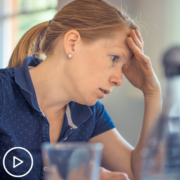Nourishing Your Body and Mind: Nutritional Advice For Cancer Survivors
There are few things more confusing to those of us who have had a cancer diagnosis than dietary advice. From conflicting recommendations from well-meaning friends to advice in magazine articles and online blogs, we can easily become overwhelmed with mixed messages.
To bring more clarity to bear on the topic I spoke with registered dietitian Cathy Leman, who is also a survivor of ER/PR+ breast cancer. In this interview Cathy separates dietary fact from fiction and offers some evidence-based tips for eating a nutritionally balanced diet which nourishes body and mind.
Q: One of the most confusing things, particularly for patients who have hormonally driven cancer, is conflicting advice about consuming phytoestrogen foods (such as soy products). What is the latest scientific evidence on this often perplexing subject?
A: This is a topic where it’s critical to know the facts! There are four main classes of phytoestrogens, of which isoflavones, the phytoestrogen found in soy, is one. Within these classes there are analogs (relating to) and derivatives (derived from). It’s common to consider the term phytoestrogen as “one thing”, as well as view the impact of eating phytoestrogen foods to be the same for everyone.
Phytoestrogen means “plant estrogen” (phyto = plant). Plant estrogens are similar to, but not the same thing as the human estrogen we produce in our bodies, called “endogenous estrogen” (endogenous = produced from within). Research on phytoestrogens and hormone-receptor positive breast cancer is ongoing, yet current data generally supports the safety of eating phytoestrogen foods for the general population, women with benign breast disorders, those at risk, and even in survivors of breast cancer.
Scientific literature reports both benefits and risks, yet the unfavorable effects have been mainly suggested based on data from in vitro, animal or epidemiological studies. Clinical studies often report the absence of unfavorable effects.
Another consideration is that the metabolism of phytoestrogens is highly variable among individuals. Differences in gut microflora, use of antimicrobials, intestinal transit time and genetic variation all play a role.
Take home message: further studies are needed, we don’t yet have conclusive results, there are no recommendations to exclude phytoestrogen foods from the diet.
Q: We hear a lot of talk about adding nutritional supplements to our diet. Are these a good idea?
A: Food first! That’s my professional philosophy, and the science supports. There is room for supplementation, yet not just for the sake of supplementing. Diet is the star, supplements, as their name suggests, take the supportive role.
Q: Do you have any tips for cancer patients who are currently in treatment and may lack motivation to cook healthy meals because of taste changes, nausea or fatigue?
A: My expertise is in working with post-treatment survivors, so I always suggest cancer patients seek the guidance of an oncology dietitian for targeted advice to manage these side effects.
Q: Cancer doesn’t just affect our bodies, our emotional and mental health can also suffer too. What’s the role of diet in improving our overall well-being?
A: When we eat well, it helps us feel we’re doing what we can to be well, and it’s empowering to know you’re taking charge of your health. Also, when one improves their diet, other healthy habits tend to follow, such as getting regular physical activity, prioritizing sleep and managing stress. Also, our bodies and minds require certain nutrients for repair and to aid in transport and storage of the building blocks necessary for overall good health.
Q: For those of us diagnosed with breast cancer we run a real risk of treatment induced osteoporosis (loss of bone density). What advice can you offer us to minimize the impact of treatment on our bone health?
A: There’s much to consider with regard to osteoporosis risk. For example, dietary pattern, exercise type and frequency, calcium absorption rates, minerals and other compounds that impact absorption, and genetic risk factors (that’s not an exhaustive list!). I recommend working with a dietitian to asses individual risk and develop a plan to address any areas of deficiency.
Q: Finally Cathy, for readers who may feel overwhelmed by the prospect of overhauling our diet, what’s the one thing we can do right away that can start to move us in the right direction?
A: Abandon the idea of overhauling your diet. Instead, consider making small, incremental, sustainable habit changes over time.
About Cathy Leman
Cathy Leman helps survivors of hormone-positive breast cancer rebuild trust with food and their body, end food fear, confusion, and overwhelm, eat without stress and guilt, and gain peace of mind and confidence about nutrition, exercise and well-being, so they can rebuild their health after treatment.
Cathy is a registered dietitian, nutrition therapist and coach, personal trainer, speaker, and a survivor of hormone-positive breast cancer. Learn more Cathy and REBUILD, her private coaching program here: www.cathyleman.com

A Stanford Medicine X e-Patient scholar, Marie Ennis O’Connor is an internationally recognized keynote speaker, writer, and consultant on global trends in patient engagement, digital health and participatory medicine. Marie’s work is informed by her passion for embedding the patient voice at the heart of healthcare values. She writes about the experience of transitioning from breast cancer patient to advocate on her award-winning blog Journeying Beyond Breast Cancer.






